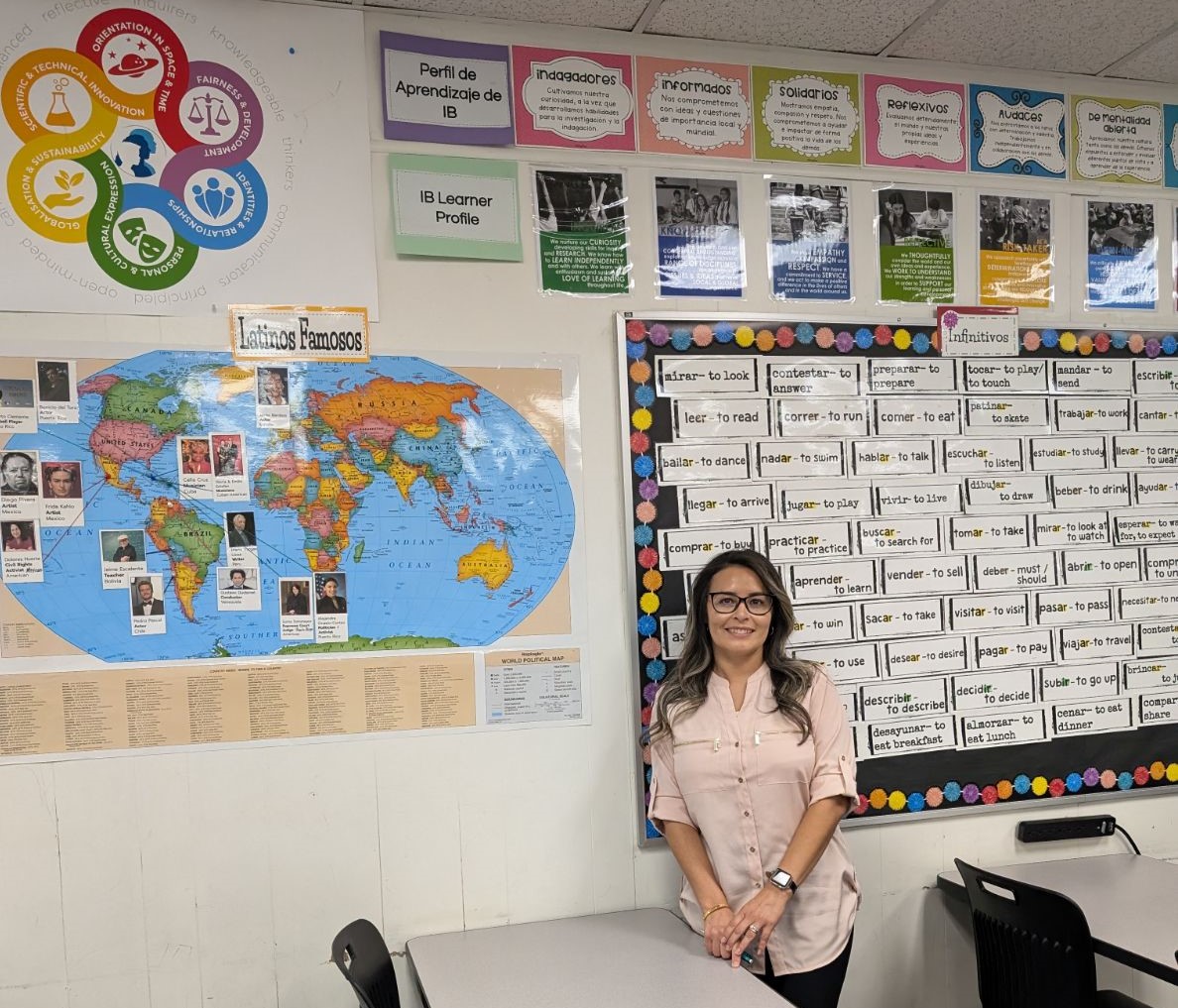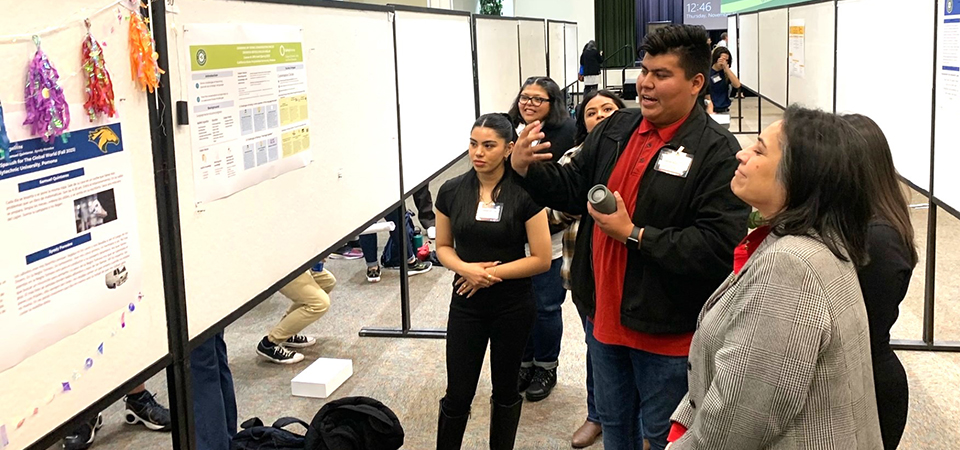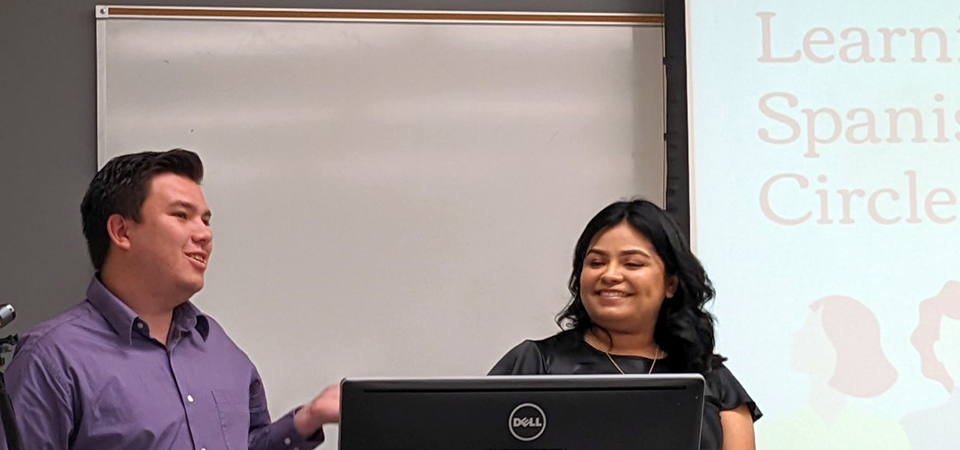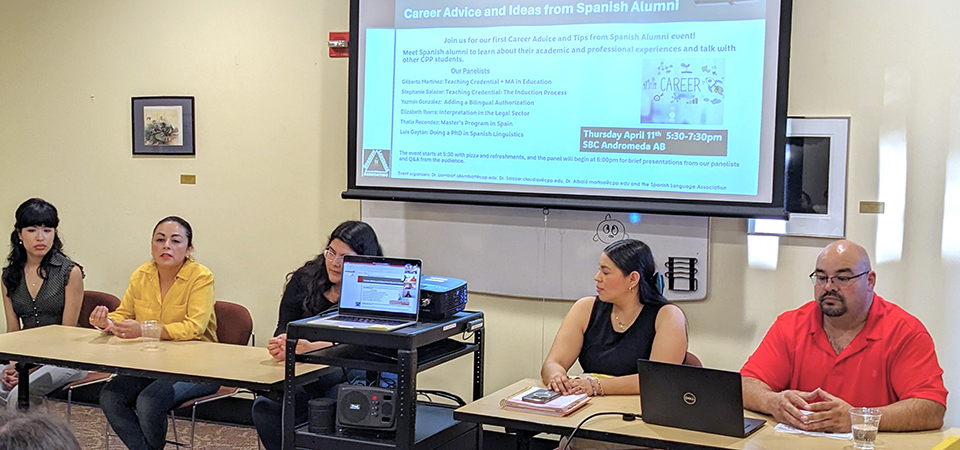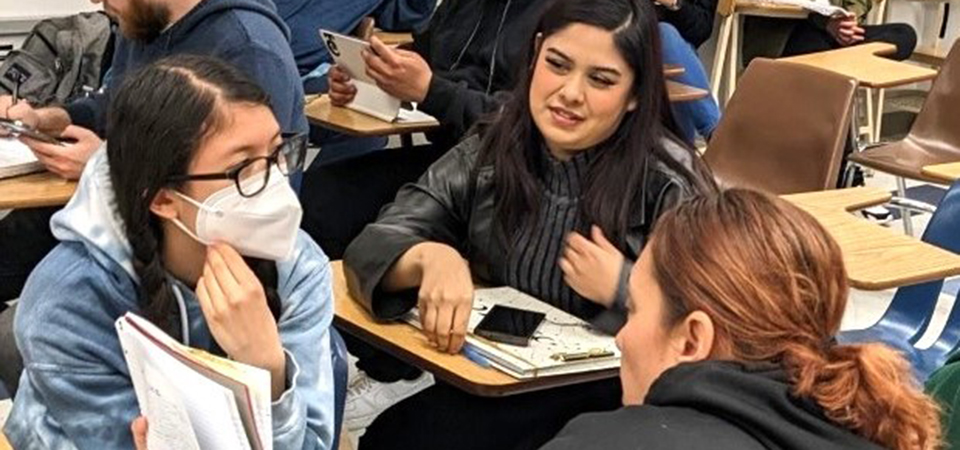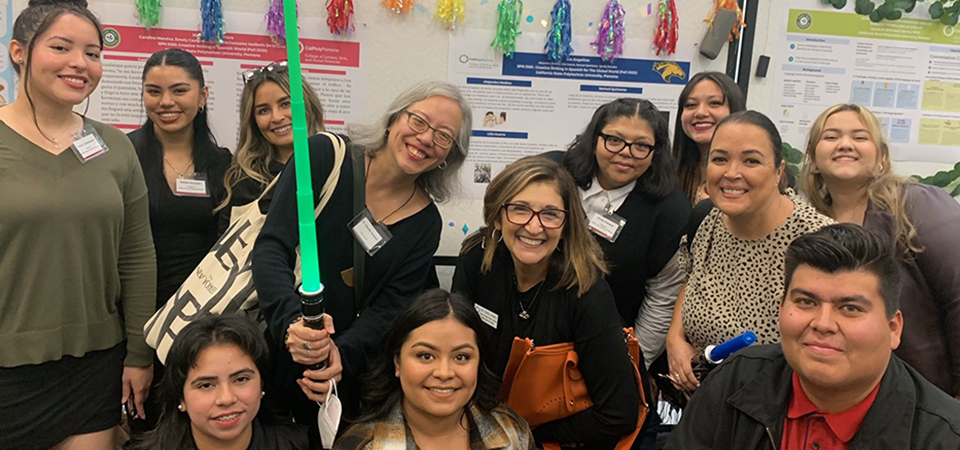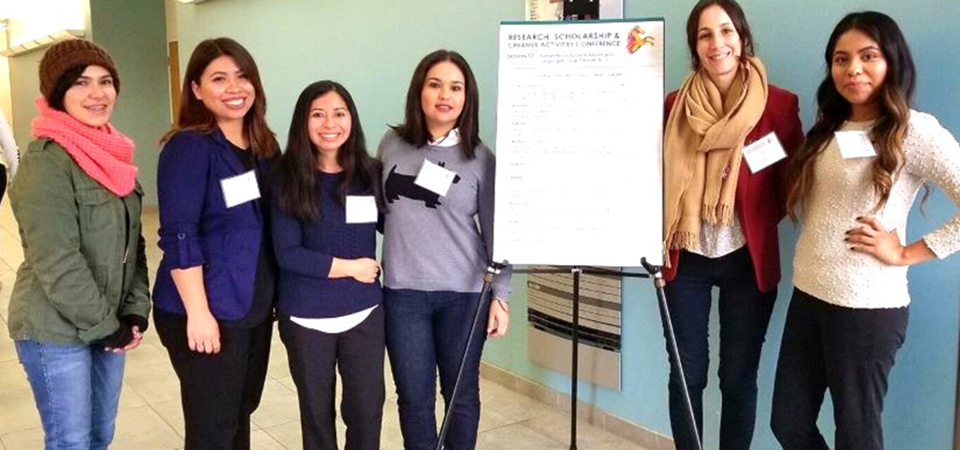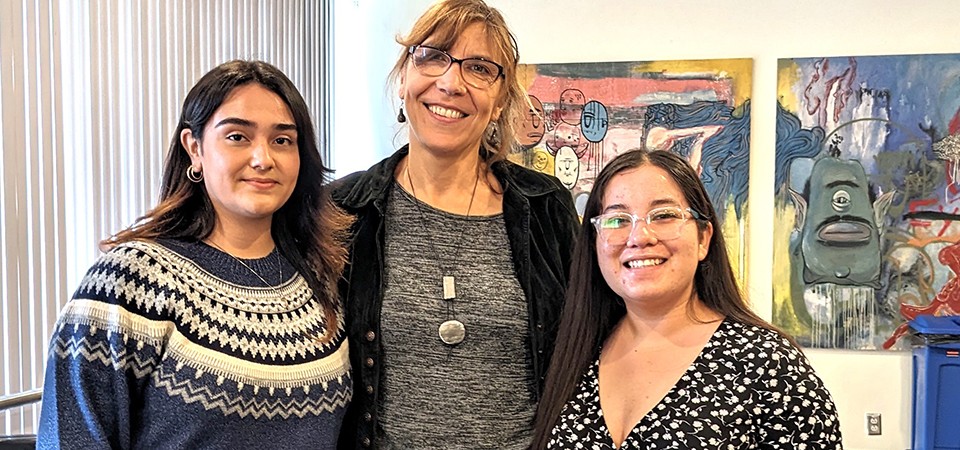Spanish
The department offers the Spanish Major and the Spanish Minor. The major is essentially a pre-professional degree, preparing students for further study or for work in a variety of settings, domestic and international. The Spanish Minor adds value to many majors, and for this reason is one of the most popular minors on campus. Click through the following tabs for detailed information.
The primary goal of the Spanish major is to equip students—both heritage and second-language learners—with a high level of trans-lingual and trans-cultural competence, preparing them to act professionally in work environments with educated native speakers of Spanish. Through our linguistics courses, students develop detailed knowledge of the intricacies of Spanish, and of language more generally. Our literature courses stress essential skills such as critical reading, writing, argument, and analysis, in addition to the vital cultural touchstones that constitute cultural competence.
Since the inception of the major in 2000, we have a strong record of placement in Spanish Ph.D. programs at campuses of the UC system. Our graduates are well prepared to pursue work opportunities internationally, or in transnational companies in the US. The Spanish B.A. is especially well suited for students wishing to teach Spanish in middle or high schools, since it provides the subject matter competency necessary to pursue a Teaching Credential in Spanish (which is done as a fifth year of study in the School of Education at Cal Poly or at another institution).
Please consult the Spanish Curriculum Sheet at right for further details of our program, including GE requirements.
Degree Requirements
If you are a new major this year, see the Spanish curriculum for 2025-2026, which lists Major courses and General Education requirements.
If you started the major in an earlier year, see the Curriculum requirements for the academic year you started the major.
The minor in Spanish provides an ideal complement to a wide range of majors: Business, Liberal Studies, Sociology, Agriculture, Hospitality Management, and many others. Students must take SPN 2130: Spanish Intermediate Composition, either the heritage speaker track or the second language learner Intermediate-level Spanish language course, and four upper-division courses. Of these, one must be from Group A (linguistics and language) and one from Group B (literature/cultural studies). The two additional upper division courses chosen may be chosen from either Group A or B according to the student's professional and personal language goals. The Spanish minor thus allows for a great deal of flexibility and can be highly tailored.
Minor Requirements
Marta Albalá Pelegrín
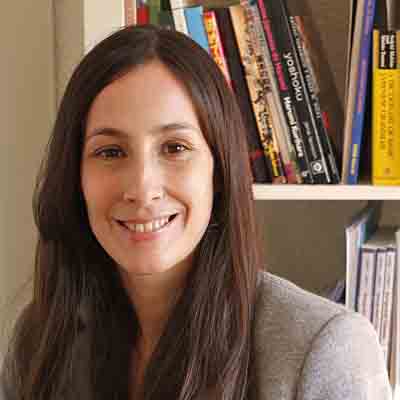
Associate Professor.
A native of Zaragoza, Spain, Dr. Albalá Pelegrín holds an M.A. and Ph.D. in Hispanic and Luso-Brazilian Literatures and Languages from the Graduate Center of the City University of New York (CUNY). She specializes in 16th and 17th century Spanish Iberian Literature, and in Early Modern Theater.
Isabel Bustamante-López

Professor.
A native of Santiago, Chile, Dr. Bustamante-López holds an M.A. and Ph.D. in Romance Linguistics from the University of Michigan. Specializing in Spanish Linguistics, she focuses on languages in contact, bilingualism and identity.
Kent Dickson

Professor. English and Modern Languages Department Chair.
A native of Seattle, Washington, Dr. Dickson holds an M.A. and Ph.D. in Hispanic Languages and Literatures from UCLA. He specializes in Latin American literature of the 19th-21st centuries, particularly Perú and México.
Amàlia Llombart

Professor. Modern Languages Coordinator and Spanish Single Subject Advisor.
A native of Barcelona, Spain, Dr. Llombart holds a Ph.D. in Hispanic Languages and Literatures from the University of California, Santa Barbara.Her research areas include syntax, applied linguistics, sociolinguistics, and heritage language teaching. Her current research focuses on the development of literacy in Spanish heritage language learners.
Natalia Lyon
Lecturer. A native of Russia, she holds an M.A. in Spanish from Cal State Fullerton. She specializes in Spanish language.
Oscar Romero
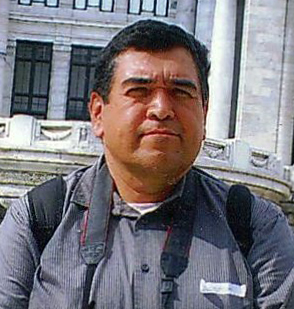
Lecturer.
A native of Southern California, he holds a Ph.D. in Hispanic Languages and Literatures from U.C. Berkely. He specializes in Latin American and Chicano literature and culture, and Spanish language. He is pictured here at the Palacio de Bellas Artes in Mexico City.
Claudia Salazar Jiménez
Assistant Professor. Spanish Minor Coordinator.
Dr. Salazar Himenez was born in Lima, Perú, and studied Literature at the National University of San Marcos before earning a Ph.D. in Literature from NYU. Her first novel, Blood of the Dawn, was awarded the Americas Prize of Hispanoamerican Narrative in 2014. She teaches Latin American literature and creative writing, and specializes in women's and gender studies, visual cultures, performance studies, Andean studies, and the politics of memory.
Mercedes Vargas
Lecturer. A native of Mexico, she holds an M.A. in Spanish from Cal State Fullerton. She specializes in Spanish language.
Esther Vogel
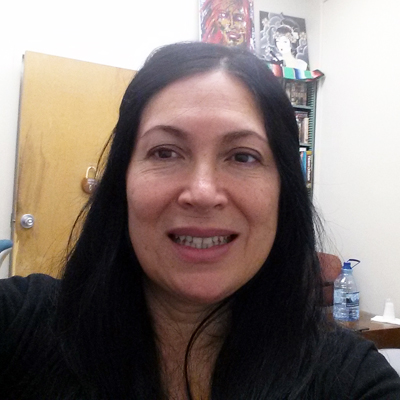
Lecturer.
A native of Honduras, she holds an M.A. in Spanish from Cal State L.A., and specializes in Spanish linguistics and language teaching.
A period spent immersed in the language and culture of another place can be a transformative experience. Linguistically, it can lead to rapid improvements in proficiency. Intellectually, it is almost certain to transform the way a student views the world. Personally, it can be a journey that leads one to a more mature and responsible outlook. Study abroad experiences contribute to producing globally-aware, curious, empathetic, citizens of the world.
Two types of programs are available. Those interested in less than a full year can work with the Cal Poly Pomona International Center. Those considering a full year of study abroad (the gold standard) should work with the CSU office of International Programs.
Financial aid does apply to programs run through the both these offices and a study abroad experience can be surprisingly accessible.
We encourage all our majors to consider spending time abroad. All CSU International Programs classes are transferred automatically. For students who have gone on other programs, we will work with you to make sure your classes transfer and are counted toward your major.
Many of our students fall somewhere along the heritage speaker spectrum. If this is your situation, there are good reasons for you to want to study Hispanic literature, culture, linguistics and the Spanish language at an advanced level: professional reasons (becoming a professional teacher or translator/interpreter gives you a platform for engagement with the Spanish-speaking Latino community of the Inland Empire); intellectual reasons (fascination with Hispanic literature or linguistics at a deep level); personal reasons (having a deeper connection to one's culture); and political reasons (wanting to engage with one's community in a political way, wanting to take a position of leadership).
Mastering formal registers and written conventions is an integral part of language study. Heritage learners are quite often motivated by the desire to move with greater ease and confidence in professional or formal settings in Spanish, in both speaking and writing. Our classes are designed to increase your bilingual range and literacy.
Our philosophy is non-prescriptive: we seek to validate what you know, and in our linguistics courses we stress the importance of situating such notions as "correct" usage critically.
To become a credentialed high school Spanish teacher, students must first complete a Single Subject Teacher Preparation Program (commonly known as a Teaching Credential program) after earning their bachelor's degree. These programs are typically offered through university schools of education, such as the College of Education at Cal Poly Pomona, and can usually be completed in approximately one and a half years of study beyond the B.A.
To earn your Single Subject Credential for teaching at the high school level, you must demonstrate subject matter competence in Spanish. If you have a B.A. in Spanish, you are automatically considered subject matter competent, and you will not need to take the California Subject Examinations for Teachers (CSET). The Spanish B.A. program at Cal Poly Pomona is particularly strong in preparing prospective Spanish teachers, offering:
- Courses in grammar and phonetics: These courses help students develop a deep understanding of the structure of the Spanish language, ensuring that they are not only proficient in speaking and writing but also capable of teaching the language effectively. Students learn to explain the underlying rules and concepts of Spanish, enhancing their ability to teach the curriculum.
- Courses in cultural and literary studies: These courses enable prospective teachers to design engaging and culturally relevant lessons that promote cross-cultural understanding and appreciation. Teachers are prepared to create a rich curriculum that reflects the diversity of Spanish-speaking countries and cultures.
- Courses in applied linguistics: In these courses, prospective teachers learn how languages are acquired and the methods used in language instruction. Additionally, they gain insights into bilingualism and bilingual practices, which is particularly important for understanding the sociolinguistic background of many students in Southern California.
Admission is a two-step process: university admission and program admission. Please visit the following site to learn about the application requirements:
Single Subject Teaching Credential Program - Program Application
In addition, every semester there is at least one information session about the Spanish teaching credential program. Make sure you attend before your senior year, so that you have time to prepare.
For more information about the Single Subject Teaching Credential Program contact Dr. Amàlia Llombart (allombart@cpp.edu).
